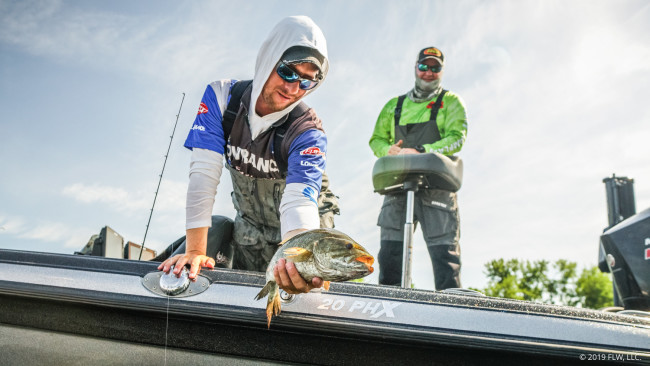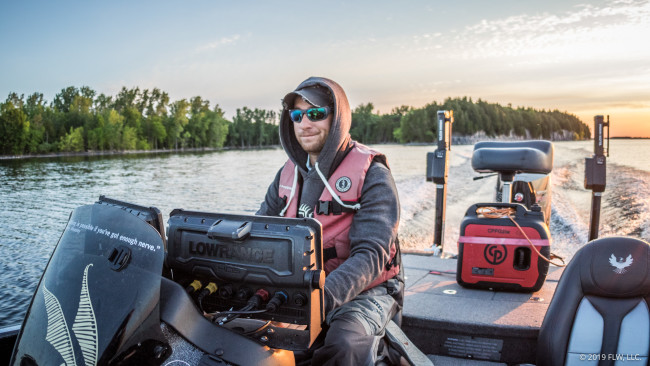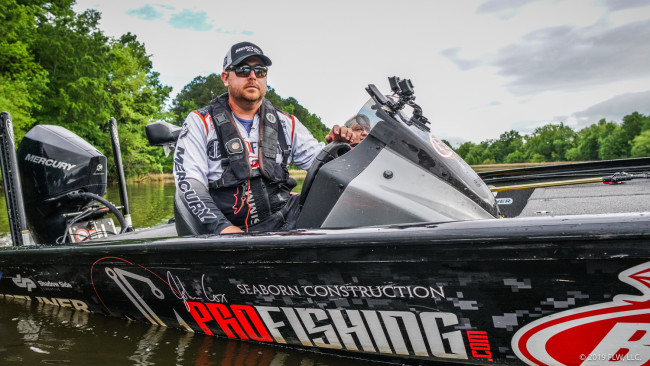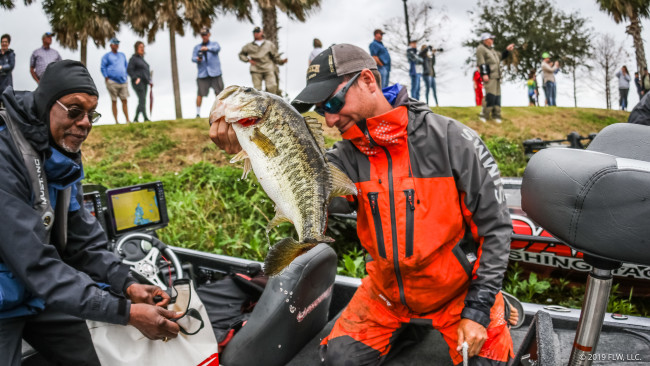Do you need a generator for bass fishing?
Weighing the pros and cons of investing in generators or lithium batteries for extreme circumstances

Trolling motor batteries aren’t much of an issue most of the time. Unless the charger goes out or a battery dies, you’re usually in pretty good shape for a day of fishing. Sure, a full day from dawn to dark will sometimes run them down, but for most people the standard rig of three 12-volt lead acid batteries does an ample job.
However, there are times when that setup isn’t enough, or when reliable power in remote sites is hard to find. For that, some pros have turned to generators to juice things up.

The primary use
Austin Felix has been running a generator for a few years now, and his primary use is during the spring in the North, when he’s spending mega-days on the water practicing for tournaments that feature bedding smallmouths.
“On lead acid batteries, at least up north in the springtime, the days are so long, and if you’re looking for spawners or covering a lot of water you tend to run your trolling motor on such a high speed that you burn down your batteries really quick if you don’t have one [a generator],” he says. “At the Costa FLW Series event at Champlain last year, I didn’t have a generator because it got stolen out of the back of my truck and I didn’t replace it. I would go out early in the morning, and my batteries would be dead from looking for bed fish at about 1 o’clock. So, I’d go in and charge for a couple of hours and then go out in the evening.”
Running a generator during practice for the FLW Tour event this June, Felix was able to search all day. However, using a generator isn’t a magic bullet that will save you whenever you need it. It takes a little planning to get the most out of it.
“The thing you have to understand about the generator is that it doesn’t really charge your batteries,” says Felix. “So, it’s important to run the generator early while you still feel like you have a lot of battery. My generator probably runs seven or eight hours on one tank of gas, so I’ll fire it up in the first hour or two and then let it run until it dies, and then finish out the day on just the batteries.”

The setup
Felix runs a 2,000-watt portable inverter generator from Chicago Pneumatics that can be found online for about $560. It’s a gas-powered model that he mounts on the back deck of his boat against the seat post. Using a short extension cord, he plugs in his Minn Kota MK 460PC on-board charger, which is a four-bank charger that puts out 15 amps per bank.
“I got the 2,000-watt because it has more uses,” says Felix. “I carry it with me just about all the time. If things go down at the house I can charge other stuff and run a bunch of things. You can do the same thing on just a 1,000-watt generator, but they tend to burn out after a few years if you use them a lot.”
Felix says that the unit is waterproof and can run in the rain all day, and the fact that he’s put it through so many days on big water up north speaks well of its reliability. That said, it’s worth keeping an eye on your particular setup. Felix says that during the FLW Tour event at Champlain, some pros had trolling motor problems that may have been caused by running a generator.
“I spoke with the people at Minn Kota, and they said it’s fine to run it that way with their charger,” says Felix. “I have heard that the extra current running through the boat can put stress on the trolling motor itself. I haven’t had an issue with it, but I know of people who have supposedly burned out their trolling motor because of that. But, I haven’t seen it personally happen. As much as I’ve stood on it, it’s been fine.”
Other factors
Getting a generator isn’t necessarily just a cut-and-dried go. Though Felix says he’s used it occasionally in dock tournaments to fish every dock in the lake, and obviously to charge other things, it isn’t super useful for him in the South.
“They’re shorter days, and looking for largemouth bed-fishing is a lot different,” says Felix, who has caught plenty of spawners in Florida. “You have to move slower because of the grass, and they’re spookier. It’s not nearly as fast paced.”
Additionally, with new trolling motors with brushless motors from Lowrance and Garmin that advertise longer run times and better efficiency about to come into wider use, the need to push batteries to the max could be mitigated. Of course, the new motors have seen fairly limited use as of now, and for the average angler a new trolling motor isn’t necessarily on the docket.
The rules of the tournaments you fish might also impact your decisions. On the FLW Tour, running a generator in practice is all well and good, but it isn’t allowed on tournament days.

Considering lithium
If you need more power and a generator doesn’t seem like the right call, you might want to think about lithium batteries. John Cox takes it to the extreme, running not one, but two sets of 12-volt lithium batteries he can switch between throughout the day. Cox is a big believer in lithium, saying that his trolling motor acts like a whole new machine compared to the old days of lead acid batteries. However, lithium batteries still require a significant initial investment.
“I got the generator for like $600,” says Felix. “The investment on lithium was like five grand, give or take.”
Since Felix bought his first generator, lithium batteries have continued to get cheaper and better. Now, you can outfit a boat with three 12-volt Battle Born Batteries for about $2,850, and depending on your onboard charger you might not even need to buy a specialized one.
FLW pro Matt Stefan started running lithium batteries this year, and he says he regrets not doing it earlier.
“The benefits are ridiculous,” says Stefan, who uses Battle Born Batteries. “If you’re fishing in current and you’ve got it on high all day, you can fish all day. You can get two full days without drawing them down. If you’re on a place like the Mississippi you used to feel them drawing down at the end of the day, but you don’t have that with lithium batteries.”
As a Northern pro who’s spent a lot of time on the Mississippi River and hunting bedding smallies, Stefan has experience using a generator, too.
“The generator is fine, but Felix had to have it running first thing, and it’s not like they’re quiet,” says the Wisconsin pro. “You could argue they could deter fish. Smallmouth locked on beds probably aren’t going to go anywhere, but you don’t know that.
“I have done it, and the one he’s got is a lot better than the one I had. The one I had would still run my batteries down at the end of the day,” adds Stefan. “But, I’ve done it on the Mississippi River, before Power-Poles and those kinds of things.”
Both lithium batteries and a generator are more long-term investments than simply rigging a boat with what you can get cheaply and easily. For most people, the average trolling motor and battery setups are going to be fine most of the time. But sometimes edge cases call for extra power, and luckily there are more than a few options out there for anglers.
